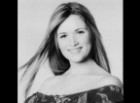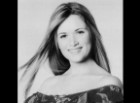To country diva Melanie Laine, life is not about the glamour of the spotlight, but about doing what she loves to do and being true to herself.
Since she was "discovered" at the GX94 Star Search Competition in 1996, Melanie continues to permeate the country music scene, year after year, with country-wide radio play and tours, Saskatchewan Country Music Award nominations and awards, a newly released full-length album, showcases at Las Vegas venues, and a music video (which debuted on CMT on March 21).
"It's all been so unexpected," Melanie humbly explains. "Everything I've done has been a big learning process."
According to Melanie, the down-to-earth Saskatchewan girl that she is, one of the most important lessons learned is the importance of creating relationships and networking with people involved in every aspect of the music industry. Melanie and I discussed this concept, her rise to fame within the Canadian music industry, and what it took to get there.
When did you first become interested in the music industry?
I think things came down through the generations to me. My mom, aunt and grandmothers were all into music. So, I wanted to become involved too. I took piano lessons and was in the school band. But, when it came down to it, singing was what I really loved to do. My voice is my instrument.
Being that the Star Search was one of your first public appearances, were you nervous performing in front of others or did it come naturally?
I was nervous. But, I did my practicing and I knew that it was what I had been waiting for. So, I just told myself, "Melanie, just go out there and do what you have to do."
When you entered the competition did you already know that you wanted a career in music - or did your win push you in?
It's something I've certainly wanted to do from the start. I guess one day I just decided, "This is what I'm going to try." But once I entered the Star Search and won, it took me to another level. Through that I was able to do two recordings and, from there, I went on the GX Tour of Champions.
How did become involved in the music industry after the Star Search? What did you learn along the way?
Through the GX Tour I met Dean Kush from Faster Gun. Soon after, we started a songwriting relationship. We wrote a duet called "I Have Memories Too" that we sent to the British Columbia Country Music Association's "Talent on Tape" Contest. Incidentally, we won the Top Duo Vocal Performance. We also entered that song in the John Lennon Songwriting Content and received an honourable mention.
It was a great experience and I learned so much along the way. In this industry, you meet new people all the time. Through the contests, Dean introduced me to my current manager, Jimmy Dean of Jam Lode Entertainment.
How long have you been under management? Which ends of the business do you handle yourself as opposed to your manager? And, why do you feel it's beneficial?
I've been under management since 2002. We work as a team and if I have an idea I suggest it. Management does a lot of paperwork and takes care of a lot of the creative end of things, like running my website and designing posters. They also help me create relationships with booking agents and clubs. It's a lot easier for someone else to talk about you, than to talk about yourself.
When did you begin writing your own songs? What type of technique does it involve? Do your songs hold a certain theme?
I started doing a little bit of songwriting before I entered the Star Search, but not a lot. Songwriting is a skill and it takes a lot of practice. For me, it takes something really heart-wrenching to get the right words to come out. But, the more technique you (know to) put towards it, the better you get at it. I think songwriting technique just kind of evolves. Sometimes you hear a line that catches your attention right away, so you work around that line. Sometimes I'll just be fiddling around on the piano with a melody that I like and just sing whatever comes out of my mouth.
Most of my songs are about situations and life's tragedies. I think I always seem to come back to relationship themes.
What were you looking for in the song selection process for your CD - in particular, for the songs that you didn't write? How long did it take?
I started the album in 2001 - hence, the title Time Flies! A big thing about recording the album was getting all the finances in place. The songwriting and song selection process was also a big step.
Choosing songs for a CD is a long process. We probably listened to a couple hundred songs. Sometimes as soon as you hear the first ten seconds you know. Other times it takes a lot more than that. We listened to lyrics to decide if they were strong enough and we listened to the melody and asked ourselves: "Would people sing along? Would people dance to this?"
In your "thanks" on the CD you describe your friendship with your industry colleagues, friends & family as being "So Saskatchewan". Can you explain this why these relationships are so important to you?
It's all about being true to yourself and having people around who support you and your passion. It's kind of a chain. If you have enough people around you who believe in you, then it's going to make you stronger as an artist and as a person.
Can you tell me about your recent experiences in making your first video? What was the concept of the video?
We shot the video in Saskatoon at the Bessborough Hotel. The shoot itself took two days. The first day we were there from 9 am to 10 pm, and the second day we were there from 7 am to 5 pm.
The song we chose for the video is "If Love is a Weakness". It's about bringing down the barriers. The video was scripted and directed by Tony Hrynchuk (from Fahrenheit Films in Saskatoon). Most of the video is performance stuff, but there is a bit of a storyline with myself and a 'significant other', played by Saskatoon's Steve Hussar. He was in Brad Johner's "Hello" video.
In the video Steve is dropping rose petals and I'm following to see where it leads. In the end, I'm running into his arms with a big smile. There was great chemistry between us.
What was involved in getting a grant through CMT's Video Advantage Program to shoot the video? Do you have any advice for fellow musicians applying for grants like this?
First, Tony and a writer got together to write the script. Then, from the script, his prepared his budget. We also had to do our own budget and get a contract and distribution deal in place. Together with that, we got all the promotional material that we had, put it all together by the deadline (Dec. 30/04) and crossed our fingers. We found out we got the grant in the middle of January and then shot the video in the middle of February.
The song is the most important thing. If the song is strong enough, then you have a good chance. But, you have to have the whole package. You have to spend a little to get a little out of it. Be confident. If you get turned down once, you can't give up, especially in this industry. If you really want to do it and it's your passion, keep with it.
How has your musical style changed over time? What are your career goals for the immediate future?
I think I've changed as the industry has evolved. I see what the crowds like and I focus on those things. Everything I've done has really been a big learning process though.
As for my career goals, I'm going to keep on doing what I love to do. I'm already looking forward to album number two.
What did winning SCMA's "Fan's Choice Entertainer of the Year" and "Best Female Vocalist for 2003" mean to you, as far as the skills that you posses?
It felt great to be nominated, but winning both those awards was certainly unexpected. That year I had been playing a lot and doing my recording, so it was great to be recognized for that with the Entertainer of the Year award. Getting the Female Vocalist Award was also a great feeling. It shows that I'm good enough and that I have what it takes.
How much pressure do you feel as an artist going out with these titles? Do you feel you have to live up to a certain standard?
Honestly, I don't feel any pressure at all. It doesn't change the way you do things - not until you're a Keith Urban, at least. No matter how successful you are, you're still human and being a musician is just a job.
Do you feel there are any special challenges being a female in the country music industry? How do you cope with these challenges?
I think it's a challenge being a female - just because there are so many of us (in the country music industry). When it comes to that, you just have to have something special. It's important to have something that people recognize in you as different from anyone else.
People are going to judge you know matter what - whether you're good or bad. So, I just go out there and do my thing. I am who I am. I won't pretend to be someone I'm not.
Where do you see country music headed in the future?
Good question. A lot of people say that it's going to take a turn to the more traditional stuff - what's traditional by today's standards, at least. But, it's really anyone's game. Right now, it seems that anything goes.
Do you feel your music career interferes with your personal life at all? Do you have to make any sacrifices?
Yes. It's difficult because there are late hours and there are so many times when you're away from home. And, when you are at home there's always a lot of work that needs to be done. The challenge is finding a balance and knowing where to draw the line.
It can be really hard and, honestly, I just separated from my husband because of it. If you're not willing to compromise, it's not going to work.
What have been your most memorable musical experiences?
Entertaining in Alberta for the first time at "Ranchman's" was one of my most memorable experiences for sure. It was great to have my family and friends Ken and Merilyn King (Ken is the GM of the Calgary Flames) come out for the show.
Showcasing in Las Vegas (this December) was the ultimate, though. It's amazing to perform in front of a crowd like that. I'd love to do more shows like that.

Melanie Laine
Lights, Camera...
by Alyssa Robinson
July 31, 2009









